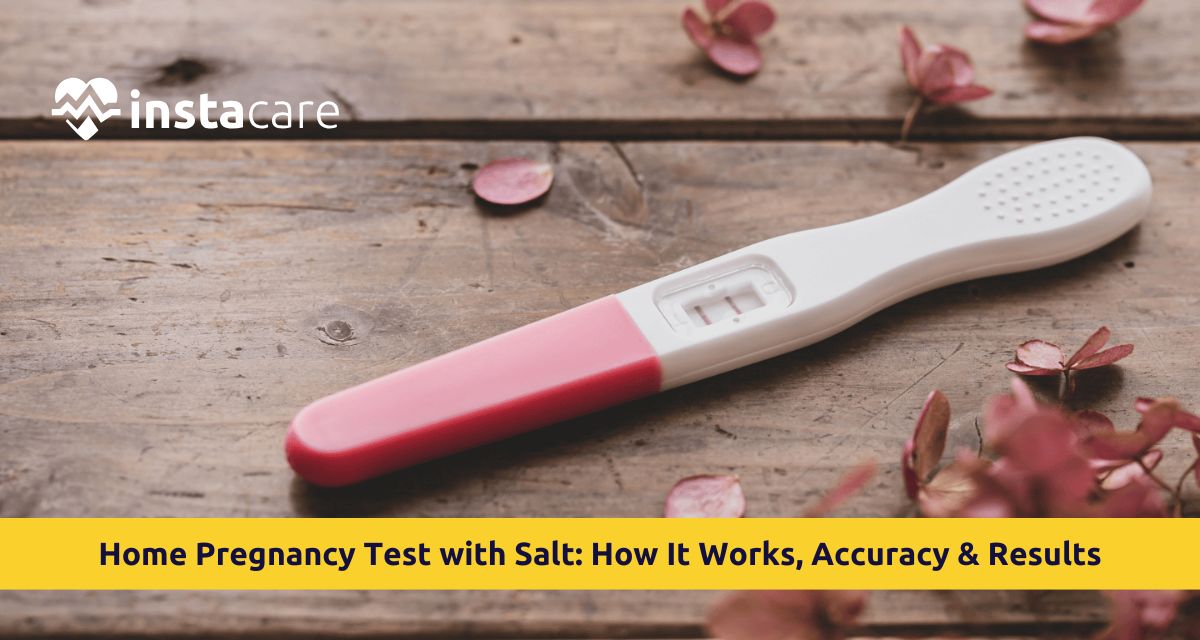People everywhere try simple, homemade pregnancy test with salt. Among them, the salt and urine pregnancy test is common. It is also known as a pregnancy test without kit. Yet, how reliable is it? Let's talk about how to do salt pregnancy test, its reliability percentage, possible results, risks, and alternatives.
What is the Salt Pregnancy Test?
Salt pregnancy test is a home test wherein you mix salt with urine to find out if you're pregnant. The premise is that the reaction between hormones in urine and salt tells you if you're pregnant or not. People claim that the hormone
hCG (human chorionic gonadotropin) in pregnant urine reacts with salt. It is claimed that the reaction causes the mixture's appearance or texture to alter. But one should note that this test has no scientific evidence. Medical professionals do not suggest it for accurate results. Yet, numerous women attempt it due to curiosity or convenience.
How is the Salt Pregnancy Test Done?
Salt pregnancy test procedure is easy and only needs two things—salt and urine. It is liked by most as it is natural, inexpensive, and fast.
- Steps to do salt pregnancy test
- Use an empty, clear container.
- Collect your first-morning urine sample, the most concentrated in hCG.
- Add two pinches of ordinary salt to the urine.
- Wait for about 5–10 minutes to observe if anything occurs.
What supporters of this technique claim is that if the mixture curdles, clumps, or its texture is altered, it can be an indication of a positive salt pregnancy test. If nothing changes, then it can be an indication of a negative salt pregnancy test. This is intriguing, but keeps in mind: no scientific explanation for these outcomes exists.
Accuracy of Salt Pregnancy Test
Salt pregnancy test accuracy is questionable, as the following reasons demonstrate:
- Salt does not have the ability to detect hCG hormone as proven.
- Alteration of texture is often random and non-pregnancy related.
- Temperature, urine concentration, and container purity affect the response.
- Two women using the same method may have completely different results.
- Doctors strongly advise taking medical pregnancy tests, though. They are designed to detect hCG over 99% of the time.
Thus, as funny as the homemade salt pregnancy test is to try, it should never replace an actual test.
Possible Results & Interpretations
Positive Salt Pregnancy Test
If there is curdling or clumping in the urine after adding salt, some say this is a positive test. People believe this shows the presence of hCG.
Negative Salt Pregnancy Test
If no response is seen or the urine remains the same, people take it as a negative result. That's what is supposed to mean that there was no hCG present.
But remember—these copies are legends. Salt can't be used to detect hormones in real pregnancy kits. So whether your test says positive or negative, you can't be certain.
Safe Alternatives to Confirm Pregnancy
To confirm pregnancy safely, the following are genuine substitutes for the salt pregnancy test at home:
Home Pregnancy Kits
They can be found at most pharmacies. They are easy to use at home. They test the hCG hormone in urine. Accuracy is more than 99% if used as directed. Always use instructions cautiously for best results.
Blood Test at a Clinic
Doctors recommend blood tests for certainty. This test measures hCG directly. It is the most accurate technique. The results are accurate and informative. It can even identify pregnancy before urine tests. Clinics provide 100% certainty results quickly.
Ultrasound Scan
An ultrasound usually follows after a few weeks. It confirms pregnancy visually. It also checks the development and well-being of the baby. Doctors use it to offer safe growth. It offers medical confirmation above hormone testing alone.
These tests are medically approved and far more reliable than salt pregnancy test vs kit.
Dangers and Myths of Salt Pregnancy Test
Dangers
The salt test is harmless to perform at home but the real risk is false positives. You may believe you are pregnant when you are not, or, conversely.
It can cause excessive stress, false hope, or delay in seeking medical care.
Common Misconceptions
Myth: Salt indicates pregnancy
Fact: There is no evidence to support this. Many believe that salt indicates pregnancy. It is not true. There is no study to prove that it reacts to hCG. Salt pregnancy test results are not predictable. Salt is just a kitchen spice. It cannot confirm pregnancy. Only physicians can give precise results.
Myth: A positive salt test always verifies
Fact: It can be misleading. Clumps are seen by some women and they assume pregnancy. It's a mistake. Clumping could be caused for other reasons. It doesn't mean hCG exists. Relying on this result can mislead so double check always with a medical test.
Myth: Salt test is similar to kit test
Fact: Medical kits are scientific, accurate. People compare salt tests with pharmacy kits. The two differ considerably. Salt pregnancy test are myths. Kits utilize science to identify hCG. Kits accuracy is greater than 99%. Always depend on authorized
medical tests for pregnancy confirmation. It's clear the salt pregnancy test approach is a myth, not a health device.
Conclusion
The home salt pregnancy test is another popular do-it-yourself test, but it is not scientifically proven. While it may be a convenient or entertaining approach, it will not definitively determine pregnancy. If pregnant, the best course is to use a pregnancy test kit, visit a physician, or get a blood test. They give precise and secure results. Salt can never replace medical science. Trusting myths may delay serious healthcare decisions. Always rely on well-established medical tests to confirm pregnancy.
Please book an appointment with the
best Gynecologist in Lahore, Karachi, Islamabad, and all major cities of Pakistan through
InstaCare, or call our helpline at 03171777509 to find the verified doctor for your disease.











